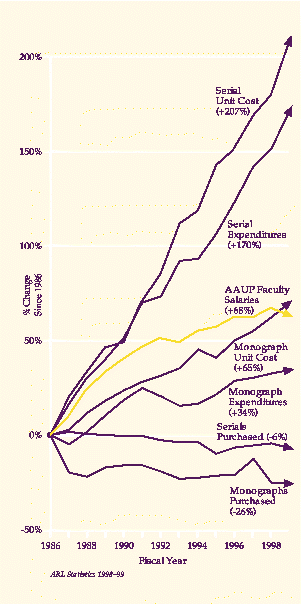A collection of summaries, abstracts, and comments from recent discussions (mostly online).
These show that while printed books and journals continue to be published at an increasing rate, this is deceptive for the academic domain. Libraries are facing a crisis, with the purchasing power of budgets having diminished sharply in the last decade. The solution being envisaged by many librarians is increased electronic publication, especially the shift of journals to the Internet. But here too we face serious problems, in particular the degradation of bibliographical standards and the absence of classification for Internet documents.
1. The Current Problem
| ANNUAL BOOK TITLE PRODUCTION | |||||||||
| YEARS —> | 1990 | 1991 | 1992 | 1993 | 1994 | 1995 | 1996 | 1997 | 1998 |
| Canada | 14 231 | 14 749 | 14 787 | 16 475 | 18 573 | ||||
| U.K. | 63 756 | 67 704 | 77 726 | 82 322 | 89 738 | 95 064 | 102 102 | 100 029 | 102 925 |
| U.S.A. | 46 743 | 48 146 | 49 276 | 42 217 | 51 863 | 62 039 | 58 465 | 64 711 | |
-- Table adapted from http://www.ipa-uie.org/statistics/annual_book_prod.html
More and more books? But what is the impact on libraries? The chart below is from Create Change, a web site and brochure of the Association of Research Libraries (USA, Canada): http://www.arl.org/create/change.html. They say (I quote):
 CREATE
CHANGE is a response to the serious crisis in scholarly communication. A number
of factors, chiefly the dramatic increases in journal costs and the increasing
commercialization of scholarly publishing, have decreased scholars' access
to essential research resources all over the world.
CREATE
CHANGE is a response to the serious crisis in scholarly communication. A number
of factors, chiefly the dramatic increases in journal costs and the increasing
commercialization of scholarly publishing, have decreased scholars' access
to essential research resources all over the world.
CREATE CHANGE seeks to address the crisis in scholarly communication by helping scholars regain control of the scholarly communication system -- a system that should exist chiefly for them, their students, and their colleagues in the worldwide scholarly community, not primarily for the benefit of publishing businesses and their shareholders.
And they add:
The average North American research library has had to cut journal acquisitions by more than 6% since 1986, and book acquisitions have been cut by 26% (my italics)
Some more statistics. In "To Publish and Perish," Policy Perspectives, Special Issue 7.4 (March 1998) [http://www.arl.org/scomm/pew/pewrept.html], the Association of Research Libraries and its collaborators remark:
Between 1986 and 1996, the consumer price index increased 44 percent. Over that same decade, the cost of monographs increased by 62 percent. . . . And the cost of scholarly journals increased a whopping 148 percent -- more than three times the rate of inflation and nearly twice the rate of growth in [U.S.A.] health care costs. The price of subscriptions to online databases grew even more rapidly . . .
2. Digitizing the literature. Who will do it?
 (April
15, 2000) The Librarian of Congress, James Billington, gave an address at
the National Press Club on Friday, April 14, on the role of the Library of
Congress in the Information Age. He harshly criticized the Internet, and stated
that the Library will not digitize books. However, the Library has plans to
expand its web publication of other materials.
(April
15, 2000) The Librarian of Congress, James Billington, gave an address at
the National Press Club on Friday, April 14, on the role of the Library of
Congress in the Information Age. He harshly criticized the Internet, and stated
that the Library will not digitize books. However, the Library has plans to
expand its web publication of other materials.
Billington elaborated on why the Library will not put books online during the question and answer session. "The rationale is two fold. We have so much special format material that nobody has seen that it is more important to get those out." He added that the Library is more concerned with "rare pamphlets" than "full books".
"Secondly, behind this ... is an implicit belief [that books] are not going to be replaced, and should not be replaced."
-- "Library of Congress Will Not Digitize Books," Tech Law Journal (April 15, 2000). [http://www.techlawjournal.com/educ/20000415.htm]
And if they do, there may be no agreement over standards:
every archival, museum, or library project that digitizes and displays complex objects needs some form of structural metadata, and every project is inventing its own data elements and format. It's hard to believe this is the best use of our collective intellectual energy.
Libraries may want to propose standards that would help them, but publishers and other commercial interests may gain no benefit:
This is likely to be an increasingly important factor in the digital library area, where our applications are not necessarily going to be of significant import to designers of computing and communications infrastructures and tools. . . . The last challenge I'll mention is the simple fact that many of the technologies we depend on are quite literally out of our control.
-- Priscilla Caplan, "Oh What a Tangled Web We Weave: Opportunities and Challenges for Standards Development in the Digital Library Arena," First Monday, 5.6 (June 2000). [http://firstmonday.org/issues/issue5_6/caplan/index.html]
Even a whole institutional field, such as the libraries or the educational system, can find itself hostage to global standards that emerge and develop a critical mass of users in other sectors. It is easy to speak of the design of digital libraries as if designers can freely choose their own directions, but in practice digital libraries emerge through negotiations in a tremendous variety of standards coalitions. Some of these coalitions are specific to libraries as an institutional field, but most are not.
-- Philip E. Agre, "Information and Institutional Change: The Case of Digital Libraries." In Ann P. Bishop, Barbara P. Buttenfield, and Nancy Van House, Eds, Digital Library Use: Social Practice in Design and Evaluation, MIT Press (in press). [http://dlis.gseis.ucla.edu/people/pagre/dl.html]
But the future may hold ebooks:
[Abstract] COMING FULL CIRCLE column discusses the transformation of the book from traditional print product to futuristic electronic unit. Predicts that in five years, e-book sales will match those of traditional print and that in ten years e-book sales will exceed print sales. Notes that in the beginning, the technology was crude, and suppliers were practically begging publishers for titles. Says that now, however, netLibrary has over 16,000 titles and is adding 2,000 each month. States that there is a huge opportunity for libraries to take the technological -- rather than traditional -- high ground. Says that the traditional book is still cheaper and more portable than an electronic book. Adds that a bigger problem is the providing scholarly legitimacy in an intensively conservative academic environment that still distrusts the validity of electronic works of scholarship. Includes a list of references.
-- Andrew K. Pace, "From Atoms to Bits: The E-volution of the Book." Computers in Libraries, 20.6 (June 2000): 64. [preprint: http://www.lib.ncsu.edu/staff/pace/pubs/cfc-03.html]
3. Difficulties in using online resources
Incompatibilities between different systems exist at our current stage. A user of digital media at Warwick University must learn to use 18 different interfaces (catalogues, CDs, web resources, etc.), in addition to conventional print resources. The Web is beginning to provide some consistency in interface, but "We have not yet converged to the well-known structures which have evolved over centuries on the print world."
-- Chris Rusbridge," Towards the Hybrid Library," D-Lib Magazine ( July/August 1998). (The author is Programme Director, Electronic Libraries Programme, University of Warwick.) [http://www.dlib.org/dlib/july98/rusbridge/07rusbridge.html]
We also read more slowly on a computer compared to paper, up to 25 percent to 30 percent more slowly. Digital text works well in some cases as long as readers are not forced to read anything of any great length from a monitor, and have an option to print easily.
-- Edward J. Valauskas, "Waiting for Thomas Kuhn: First Monday and the Evolution of Electronic Journals" First Monday, 2.12 (1997). [http://www.firstmonday.dk/issues/issue2_12/valauskas/index.html]
And consider the problem of locating what you want on the Internet, compared with the organization of a library:
Trying to find information on the Web is like walking into a library after an earthquake, with the books strewn all over the floor.
-- Debra Jones, Exploring the Internet Using Critical Thinking Skills (Neal Schuman, 1998).
4. Information wants to be free
The way of the future? Stevan Harnad proposes archiving all journal articles online, overcoming the monopolistic practices of journal publishers:
Let us call the learned research literature the "Give-Away" literature, because its authors were interested only in maximizing its impact (and thereby the impact of their work) by reaching as many interested reader/users as possible. For these Give-Away authors, the toll-gates where the nonzero costs of publication were recovered were always a lamentable filter (a financial filter), blocking access to their work, reserving it only for those who (or, rather, whose institutions) could/would pay.
He foresees the "reduction and eventual elimination of all annual Subscription/Site- License/Pay-Per-View [S/L/P] expenditure." All journals would become available free for users at every institution. This plan will not be held back by copyright: "Copyright transfer agreements today are hence merely a Faustian means of holding the literature hostage to S/L/P."
-- Stevan Harnad, "Free at Last: The Future of Peer-Reviewed Journals." D-Lib Magazine 5.12 (December 1999). [http://www.dlib.org/dlib/december99/12harnad.html]
(For the online archive that Harnad himself initiated, see Cogprints [http://cogprints.soton.ac.uk/].)
And this proposal is becoming official:
the Association of Research Libraries (ARL) with the support of the AAU, has launched the Scholarly Publishing & Academic Resources Coalition (SPARC) a partnership project enlisting the efforts of higher education institutions, libraries, scholarly societies, university presses, and other organizations to promote a more open and competitive market for scholarly dissemination through electronic publication and other means.
-- "To Publish and Perish," Policy Perspectives. Special Issue 7.4 (March 1998). [http://www.arl.org/scomm/pew/pewrept.html]
Some examples of refereed online literature journals (that don't mirror print versions):
- Early Modern Literary Studies
- Romanticism on the Net
- Postmodern Culture (access restricted to U of Alberta users)
- Kairos
- Journal of Digital Information
But, finally, where does this leave literary texts? -- for most of us, our primary resource. How adequate are online versions of the literary texts we require for teaching and research? And what does it mean to read them online rather than on a page?